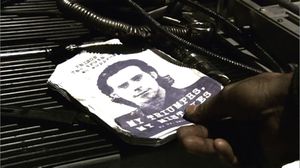My Triumphs, My Mistakes
More actions

My Triumphs, My Mistakes is a book written by Gaius Baltar while imprisoned on Galactica. In it he tells his life story and writes about the oppression of the working class of the Twelve Colonies by the "aristocracy", particularly the "Caprican elite". The current pages of the book that are in circulation were smuggled out of Baltar's cell and distributed amongst the Fleet by Baltar's lawyer. However, the book isn't finished seeing as Baltar had to turn in several new pages after being searched by Galactica's guards on the orders of President Roslin. [1]
Throughout the Fleet it is known as "the book". A copy is freely circulating on Galactica's flight deck. It fuels the already present dissatisfaction of the Fleet's workers, which ultimately leads to a strike among the crew of the Daru Mozu and the deckhands on Galactica.
President Laura Roslin initially attempts to suppress the book, but later uses it to aid in the labor squabbles in the Fleet (Dirty Hands).
Galen Tyrol finds a copy and turns to one section:
- The Emerging
- Aristocracy and
- the Emerging
- Underclass
- I wash my hands of the phony democratic system; I will never let myself be distracted by the placetory crumbs that the Caprican elite led by the Roslin administration toss into the barnyard every now and again. Many of the oppressed have realized the truth and are ready to take action, even ready to take arms ...
Another quote from the book:
- If you hear the people, you will never have to fear the people.
Baltar tells Tyrol that in the book's conclusion he asks the reader if they think the Fleet will ever be commanded by someone whose name is not Adama.
References
- ↑ The book appears to be inspired by real-world classic Marxist/Leninist philosophy.
